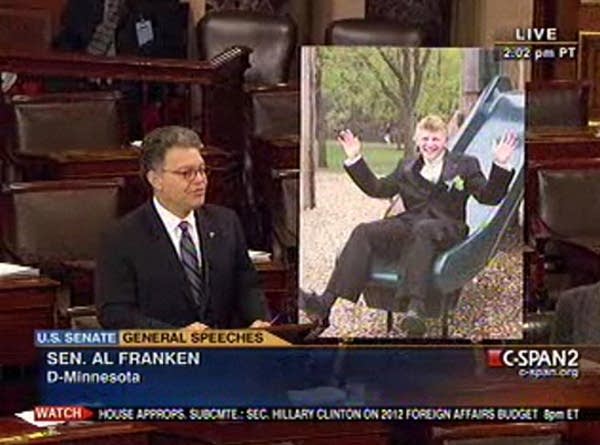Despite support, prospects are slim for federal bullying law

Despite the high profile of bullying over the past two years — including a White House summit to discuss the issue — prospects for a federal bullying law are dim.
It's not for a lack of proposals. At least six bills have been introduced in Congress this year that would boost the federal government's role in bullying prevention. They range from allowing a grant to be used for anti-bullying efforts to enacting federal protections for gay and lesbian students.
But none of those six have had a committee hearing or a vote.
Supporters of some of those bills say they're working behind the scenes to have their language added to whatever replaces the federal No Child Left Behind education law. They include Minnesota Sen. Al Franken, who is sponsoring one of those proposals, called the Student Non-Discrimination Act.
Create a More Connected Minnesota
MPR News is your trusted resource for the news you need. With your support, MPR News brings accessible, courageous journalism and authentic conversation to everyone - free of paywalls and barriers. Your gift makes a difference.
That measure has more co-sponsors of both parties in Congress than any other bullying and harassment measure. It would guarantee federal protections, including the right to sue, for lesbian, gay, bisexual and transgender students the way the Civil Rights Act of 1964 protects people of color.
"This is a category that we really know has been getting bullied, and it really is a civil rights issue," Franken said. "I hope that we'll get it to be part of the law in this Congress, but if not, it eventually will be."
Franken, a Democrat, said he's hopeful his bill will end up whatever the Senate passes to replace No Child Left Behind. But he admits the hang up could be in the House, where Republicans hold the majority.
That's where U.S. Rep. John Kline, a Republican, has a lot of sway on this topic. Kline, who represents Minnesota's 2nd Congressional District, is chairman of the House Education Committee. His work on replacing No Child is taking a different path.
Kline has split the legislation into five bills instead of one. So far, none of them include bullying because Kline said he's not sure that's appropriate for the federal government.
"We've been looking at decreasing the intervention of the federal government, particularly in education," he said. "So to start a new program — I'm a little reluctant to jump out there unless I saw an incredible likelihood that it would make a difference, and I'm not sure it does."
Supporters will counter that the lack of a federal law leaves a patchwork of policy and laws across states and school districts. Minnesota, for example, has one of the nation's weakest state bullying laws. It only requires districts to have a policy, but doesn't define bullying or require data collection, as many states do.
Shawn Gaylord, policy director for the Gay, Lesbian and Straight Education Network, said none of the federal bills his group supports would address every single incident of bullying.
"It simply sets a minimal requirement so there's a safe environment in every school, and we do think that's an appropriate role for the federal government," he said.
Given the hesitancy of GOP leaders like Kline, Gaylord and other advocates aren't hopeful.
"I think there's zero chance that we're going to see anti-bullying legislation passed in this Congress," said Kevin Jennings, former assistant deputy secretary of the Office of Safe and Drug-Free Schools inside the U.S. Department of Education.
"I think there's zero chance that we're going to see anti-bullying legislation passed in this Congress"
Jennings, who now runs the non-profit Be the Change group that creates national issue-based campaigns, said gridlock in Washington, D.C. has made it difficult to make progress on bullying, even though some bullying bills have widespread, bipartisan support.
Another bill, the Safe Schools Improvement Act, would require states to collect data on bullying and harassment.
It's unclear whether Minnesota would have to change its system, which only tracks bullying that is punished with at least a day's suspension. Researchers say the policy is inadequate as many cases of bullying either go unpunished or is addressed less severely.
The Safe Schools bill also would require schools to report how many bullying incidents took place. That's not currently required in Minnesota.
Franken and U.S. Sen. Amy Klobuchar are co-sponsors of that bill, as are U.S. Reps. Keith Ellison, Betty McCollum and Tim Walz. All are Democrats.
The Obama administration has yet to take a position on any bullying proposal. Its officials say they are instead working to raise awareness of bullying and best utilize existing law.
One example was the symbolic step this spring of holding the first-ever White House summit on bullying.
Last fall, the U.S. Department of Education sent all schools a note, reminding them of their responsibility to address bullying. The letter notes that some bullying behavior might fall under federal laws, and the department's Civil Rights office will investigate.
